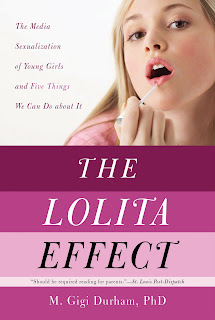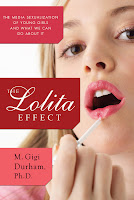 Carol Midgely looks at The Lolita Effect, by M. Gigi Durham, in The Times: "Last Halloween, Gigi Durham opened her front door to find a five-year-old girl standing on the doorstep. The child was wearing a boob tube, gauze miniskirt, platform heels and glitter eye-shadow. “I’m a Bratz!” she declared. Durham was put more in mind of a child prostitute that she had once seen in Cambodia. There wasn’t that much to choose between the two girls’ outfits.
Carol Midgely looks at The Lolita Effect, by M. Gigi Durham, in The Times: "Last Halloween, Gigi Durham opened her front door to find a five-year-old girl standing on the doorstep. The child was wearing a boob tube, gauze miniskirt, platform heels and glitter eye-shadow. “I’m a Bratz!” she declared. Durham was put more in mind of a child prostitute that she had once seen in Cambodia. There wasn’t that much to choose between the two girls’ outfits.
So begins Durham’s new
book,
The Lolita Effect, a critique of the modern obsession with prematurely sexualising young girls and a manifesto on how to renounce it. We have all seen this “effect” — the push-up bras for pre-teens, the satin thongs and “Eye Candy” T-shirts, the pink plastic “Peekaboo Pole Dancing” kit that was sold at Tesco, the magazines that tutor girls who have barely started their periods how to pander to an imaginary “he”. Who would disagree that the “baby-faced nymphet” — perhaps embodied most explicitly by a school-uniformed Britney Spears in the Baby One More Time video — is a regular fixture on the media landscape? What we might disagree on though is how to counteract it. Some believe that shielding girls from sex for as long as possible — preaching the abstinence message and the pregnancy/STD/victimhood perils of sex — is the only way.
Durham disagrees. Girls do not need “rescuing” from sex, she says. Merely the media’s one-dimensional, profit-driven version of it, which is based purely on male fantasies without a nod to female needs or desires. Rather, girls should be encouraged that it is their right to enjoy it, thus reclaiming their sexuality from a culture that increasingly positions them as passive, objectified sex kittens who are not encouraged to actually want sex or get any pleasure from it yet are mandated to be desirable to males — to look up for it but not, of course, act on it, for that would be sluttish.
What we should also do, says Durham, is empower them to see how skewed marketing messages manipulate females to reach for impossible standards of beauty — the Barbie body — as the one and only way to be “hot”. The reason this is peddled globally as the ideal female model is because it is profitable. A billion-pound industry of cosmetics, diet aids, fashion and plastic surgery depends upon it. It is this that makes millions of girls develop, very early in their lives, a false “self”.
“The Lolita effect begins with the premise that children are sexual beings,” says Durham. “As they mature they deserve to be furnished with factual, developmentally appropriate and useful information about sex and sexuality.” She describes herself as a “pro-sex feminist”. “I think sex is a normal and healthy part of life, even of children’s lives. I want my two young daughters — indeed all girls — to grow up unafraid of and knowledgeable about their bodies, confident about finding and expressing sexual pleasure.” This is not to encourage under-age sex — though she believes that non-coercive sex between teenagers is not automatically harmful and that we shouldn’t always treat it as though it’s the end of the world — but to encourage more public discourse on it. “I think that a lot of girls under 16 have sexual feelings. My belief is that the longer they wait the better they’ll deal with it because the older you are, the more capable you are of thinking through the consequences, where you stand and what you want. But we shouldn’t though be so terrified of the idea that kids are thinking about it because it really is a very normal part of adolescence.”
We cannot, however, just blame the media for this state of affairs. None of this would happen if people didn’t buy into it. True, says Durham. In fact, studies have shown that parents, teachers and other adults may unconsciously perpetuate the Lolita effect.
Do you? Do you instinctively favour prettier children who meet the Lolita criteria, while reacting negatively to plainer girls with larger bodies? Do you compliment female children on their looks, clothes and hairstyles, sometimes forgetting their achievements in a way you never would to boys?
“I see this a lot . . . when I watch people interacting with children,” Durham says. "People are very quick to praise girls especially for their looks, ‘Oh, how pretty you are/ great dress/ I love your hair today’, those kinds of things. And girls don’t get complimented on their achievements [in the same way that boys do] or at least it’s much more infrequent.” It’s easily done — we all want our daughters to look lovely, not least, if we’re honest, because a compliment to them is a vicarious one for us. Durham says that we can combat such effects by focusing much more on their achievements — on what they do creatively, in sport, for the environment, for charity — rather than how they appear. Magazine covers, she says, hardly ever feature images of young female writers or athletes, but of models and actresses, fortifying the message that looks are everything. We can help to make girls media-literate, teach them the lies of the airbrush, engage little girls in discussion about why it’s awfully dated that Disney princesses always need a man to rescue them, send e-mails and letters to companies that use images that we find unacceptable and tutor girls in how to challenge the mythical male gaze which is so often ill-informed about what boys really “want” anyway.
What Durham advocates in her book, which she describes as a feminist manifesto, is to find a way to think about sex separately from money and with young girls perpetually cast in the man-pleasing role. “Can we move to a place where we can consider sexuality as a human impulse that’s about ethical relationships between people and not just something that generates profit?”
In other words let’s not focus not on the imaginary He but the actual Her."
 An excerpt from M.Gigi Durham's The Lolita Effect ran today in The Guardian (UK): "Lost Youth: Turning Young Girls in to Sex Symbols."
An excerpt from M.Gigi Durham's The Lolita Effect ran today in The Guardian (UK): "Lost Youth: Turning Young Girls in to Sex Symbols."
New in paperback, The Lolita Effect is a groundbreaking account of how the media sexualizes young girls. University of Iowa professor and journalist M. Gigi Durham presents new insight into media myths and spectacles of sexuality. Using examples from popular TV shows, fashion and beauty magazines, movies, and Web sites, Durham shows for the first time all the ways in which sexuality is rigidly and restrictively defined in media often in ways detrimental to girls healthy development. The Lolita Effect offers parents, teachers, counselors, and other concerned adults effective and progressive strategies for resisting the violations and repressions that render girls sexually subordinate. Durham provides us with the tools to navigate this media world effectively without censorship or moralizing, and then to help our girls to do so in strong and empowering ways.
 Professor M. Gigi Durham's acclaimed study of the media sexualization of young girls will be available in a new paperback edition next week. The Lolita Effect includes a fascinating new introduction from the author in which he discusses the Miley Cyrus/Vanity Fair fiasco that occurred just as The Lolita Effect rolled off the presses and into bookstores.
Professor M. Gigi Durham's acclaimed study of the media sexualization of young girls will be available in a new paperback edition next week. The Lolita Effect includes a fascinating new introduction from the author in which he discusses the Miley Cyrus/Vanity Fair fiasco that occurred just as The Lolita Effect rolled off the presses and into bookstores.
M.Gigi Durham will discuss
The Lolita Effect at the
Capitola Book Cafe in Capitola, California on
Thursday, July 30, at 7:30pm.
 Professor M. Gigi Durham, author of The Lolita Effect, contributes a provocative essay on sex and pornography on college campuses in the current issue of The Chronicle Review.
Professor M. Gigi Durham, author of The Lolita Effect, contributes a provocative essay on sex and pornography on college campuses in the current issue of The Chronicle Review.
"Last year," writes Durham, "the American Psychological Association convened a task force on the sexualization of young girls; the ensuing report documented the lasting harm done to girls by a culture in which they are constantly positioned as sexual objects. Worldwide, child pornography and child sex trafficking are burgeoning industries. Real-world sexual violence against women is almost epidemic."
 M. Gigi Durham, University of Iowa Professor of Journalism and Mass Communication, will appear on the nationally syndicated Fox Morning Show with Mike and Juliet on Thursday, May 22. Professor Durham is the author of a new book, The Lolita Effect: The Media Sexualization of Young Girls and What We Can Do About It, that offers insight, information, and instruction on combating the early sexualization of young girls. Tomorrow's show includes a report on Moms taking their very young daughters to Spas for facials and massages and pampering.
M. Gigi Durham, University of Iowa Professor of Journalism and Mass Communication, will appear on the nationally syndicated Fox Morning Show with Mike and Juliet on Thursday, May 22. Professor Durham is the author of a new book, The Lolita Effect: The Media Sexualization of Young Girls and What We Can Do About It, that offers insight, information, and instruction on combating the early sexualization of young girls. Tomorrow's show includes a report on Moms taking their very young daughters to Spas for facials and massages and pampering.
 M. Gigi Durham, author of The Lolita Effect: The Media Sexualization of Young Girls and What We Can Do About It, talks to Katharine Miezkowski of Salon.com about the "many ways that young girls' sexuality is shaped and exploited by a marketplace where younger is better and the line between child porn and art gets ever blurrier." In a wide-ranging interview (podcast is available on Salon), Professor Durham comments on the marketing of grown-up sexuality to little girls, the Miley Cyrus fiasco, and ways parents can open up the conversation with their daughters about images of girlhood sexuality.
M. Gigi Durham, author of The Lolita Effect: The Media Sexualization of Young Girls and What We Can Do About It, talks to Katharine Miezkowski of Salon.com about the "many ways that young girls' sexuality is shaped and exploited by a marketplace where younger is better and the line between child porn and art gets ever blurrier." In a wide-ranging interview (podcast is available on Salon), Professor Durham comments on the marketing of grown-up sexuality to little girls, the Miley Cyrus fiasco, and ways parents can open up the conversation with their daughters about images of girlhood sexuality.
 Coming next month is an important new book that is already drawing attention, The Lolita Effect: The Media Sexualization of Young Girls and What We Can Do About it by M. Gigi Durham.
Coming next month is an important new book that is already drawing attention, The Lolita Effect: The Media Sexualization of Young Girls and What We Can Do About it by M. Gigi Durham.
From Publishers Weekly: "We’ve all seen it—the tiny T-shirts with sexually suggestive slogans, the four-year-old gyrating to a Britney Spears song, the young boy shooting prostitutes in his video game—and University of Iowa journalism professor Durham has had enough. In her debut book, she argues that the media—from advertisements to Seventeen magazine—are circulating damaging myths that distort, undermine and restrict girls’ sexual progress. Durham, who describes herself as “pro-girl” and “pro-media,” does more than criticize profit-driven media, recognizing as part of the problem Americans’ contradictory willingness to view sexualized ad images but not to talk about sex. Chapters expose five media myths: that by flaunting her “hotness” a little girl is acting powerfully; that Barbie has the ideal body; that children—especially little girls—are sexy; that violence against women is sexy; and that girls must learn what boys want, but not vice versa. After debunking each myth, Durham offers practical suggestions for overcoming these falsehoods, including sample questions for parents and children. In a well-written and well-researched book, she exposes a troubling phenomenon and calls readers to action."
The Lolita Effect will go on sale nationwide on May 1.
 Carol Midgely looks at The Lolita Effect, by M. Gigi Durham, in The Times: "Last Halloween, Gigi Durham opened her front door to find a five-year-old girl standing on the doorstep. The child was wearing a boob tube, gauze miniskirt, platform heels and glitter eye-shadow. “I’m a Bratz!” she declared. Durham was put more in mind of a child prostitute that she had once seen in Cambodia. There wasn’t that much to choose between the two girls’ outfits.
Carol Midgely looks at The Lolita Effect, by M. Gigi Durham, in The Times: "Last Halloween, Gigi Durham opened her front door to find a five-year-old girl standing on the doorstep. The child was wearing a boob tube, gauze miniskirt, platform heels and glitter eye-shadow. “I’m a Bratz!” she declared. Durham was put more in mind of a child prostitute that she had once seen in Cambodia. There wasn’t that much to choose between the two girls’ outfits.






 M. Gigi Durham
M. Gigi Durham